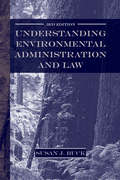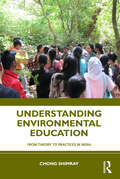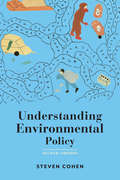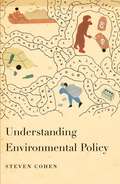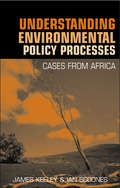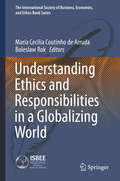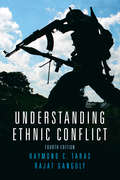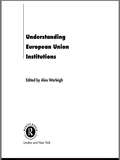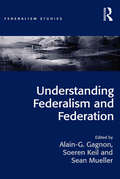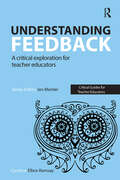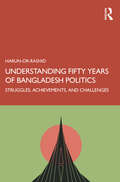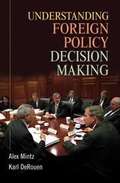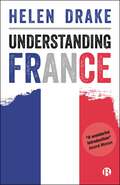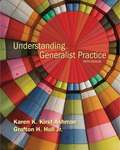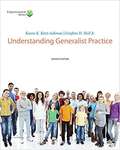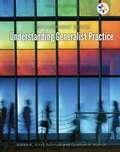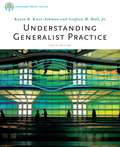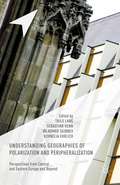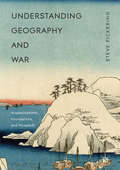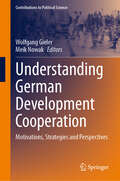- Table View
- List View
Understanding Environmental Administration and Law, 3rd Edition
by Susan J. BuckUnderstanding Environmental Administration and Law provides an engaging, introductory overview of environmental policy. Author Susan J. Buck explores the process through which policy is made, the political environment in which it is applied, and the statutory and case laws that are critical to working within the regulatory system. This revised and expanded third edition adds case studies that help bring the subject to life and includes new material on: *the Bush Administration and its approach to administering environmental laws *the continuing evolution of environmentalism and the changing role of environmental regulation in the United States *the development and implementation of environmental agreements at the international level *the impacts and implications of globalization Understanding Environmental Administration and Law provides a framework for understanding the law as a managerial tool.
Understanding Environmental Education: From Theory to Practices in India
by Chong ShimrayThe book establishes the importance of environmental education by tracing its history and the developments that have taken place subsequently to date. It provides basic understanding about environmental education as well as valuable suggestions for its effective incorporation in the school curriculum. The strength of the book lies in its content as all major areas of environmental education have been addressed such as school curriculum, professional development, and policies, especially in the context of India, thus making it a unique and go-to resource for all stakeholders working in the field of environmental education. The well-balanced content will help readers appreciate the nature of environmental education and its distinctiveness from other subject disciplines as well as environmental studies and environmental science substantiated with several examples and illustrations. What is striking about the book is its proposed road map which is critical for successful implementation of environmental education in India with the launch of the National Education Policy 2020 and the subsequent introduction of new curriculum frameworks. The book will be useful to students, preservice teachers, and teacher educators. It will also be of much value to in-service teachers, practitioners in different settings, teachers, policy makers, curriculum developers, and researchers in the field of environmental education.
Understanding Environmental Policy
by Steven CohenThe first edition of this pragmatic course text emphasized the policy value of a "big picture" approach to the ethical, political, technological and scientific, economic, and management aspects of environmental issues. The text then applied this approach to real-world case examples involving leaking underground storage tanks, toxic waste cleanup, and the effects of global climate change.This second edition demonstrates the ongoing effectiveness of this framework to generating meaningful action and policy solutions to today's urgent environmental issues. The text adds case examples concerning congestion taxes, e-waste, hydrofracking, and recent developments in global climate change and updates references and other materials throughout, incorporating the political and policy changes of the Obama Administration's first term and developments in national and global environmental issues.
Understanding Environmental Policy
by Steven CohenIn Understanding Environmental Policy, Steven Cohen introduces an innovative, multidimensional framework for developing effective environmental policy within the United States and around the world. He demonstrates his approach through an analysis of four case studies representing current local, national, and international environmental challenges: New York City's garbage crisis; the problem of leaks from underground storage units; toxic waste contamination and the Superfund program; and global climate change. He analyzes the political, scientific, technological, organizational, and moral import of these environmental issues and the nature of the policy surrounding them. He also places a specific focus on the response from the George W. Bush administration. Cohen considers how our current environmental policy and problems reflect the value we place on our ecosystems; whether science and technology can solve the environmental problems they create; and what policy is necessary to reduce environmentally damaging behaviors. Cohen's multifaceted approach is essential reading for analysts, managers, activists, students, and scholars of environmental policy.
Understanding Environmental Policy
by Steven CohenThe first edition of this pragmatic course text emphasized the policy value of a "big picture" approach to the ethical, political, technological, scientific, economic, and management aspects of environmental issues. The text then applied this approach to real-world case examples involving leaks in underground storage tanks, toxic waste cleanup, and the effects of global climate change. This second edition demonstrates the ongoing effectiveness of the book's framework in generating meaningful action and policy solutions to current environmental issues. The text adds case examples concerning congestion taxes, e-waste, hydrofracking, and recent developments in global climate change, updating references and other materials throughout and incorporating the political and policy changes of the Obama administration's first term and developments in national and global environmental issues.
Understanding Environmental Policy Convergence
by Helge Jörgens Andrea Lenschow Duncan Liefferink Helge Jörgens Andrea LenschowOver recent decades national environmental policies have become increasingly alike. This book analyses the driving forces of this process of policy convergence, providing an in-depth empirical analysis of the international forces at work. It does so by investigating how four countries – France, Hungary, Mexico and the Netherlands – have shaped their domestic environmental policies in the context of international institutions and relationships, while taking into account various domestic factors and national conditions. Employing a qualitative approach, the authors seek to deepen understanding of the processes and mechanisms through which international forces such as legal harmonisation, institutionalised information flows and global trade dynamics affect domestic environmental policy change. Together with its companion volume Environmental Policy Convergence in Europe: The Impact of Trade and International Institutions (2008) this book provides a 'showcase' of mixed methodologies, combining quantitative and qualitative approaches in an innovative way.
Understanding Environmental Policy Processes: Cases from Africa
by Ian Scoones James KeeleyA critical analysis of the post-Rio consensus on environment and development which questions the role of particular forms of internationalized elite scientific expertise. It asks why certain understandings of environmental change stick with such tenacity. In exploring this, the authors unravel the politics of knowledge surrounding policymaking, looking particularly at Ethiopia, Mali and Zimbabwe and their land and soils management. The book also looks at prospects for more inclusive, participatory forms of policymaking.
Understanding Ethics and Responsibilities in a Globalizing World
by Maria Cecilia Coutinho de Arruda Boleslaw RokThis book contemplates the ethics of responsibility in a large range of meanings, consequences and impacts. It reflects the perspectives and reasoning of 24 authors from all continents. All chapters are original papers presented at the Fifth World ISBEE Congress, that took place in Warsaw, Poland, at the Kozminski University, on 11-14 of July, 2012. In this book, ethics and responsibility are considered essential traits of character, not only in the business or governmental arenas but in any initiative, decision and activity. The contributions to this book focus on a spectrum of themes, terms and concepts, the global corporate social responsibilities perspective covering impacts, challenges, analysis, criticism, consequences of important topics of real life, sustainability, international economy and regimes, corruption, poverty and violence, among others. The book is intended for academics, researchers and professionals in all continents who are dedicated to Ethics, Business Ethics, Corporate Social Responsibility, Social Innovation, and Sustainability Management.
Understanding Ethnic Conflict
by Rajat Ganguly Raymond TarasUnderstanding Ethnic Conflict provides all the key concepts needed to understand conflict among ethnic groups. Including approaches from both comparative politics and international relations, this text offers a model of ethnic conflict's internationalization by showing how domestic and international actors influence a country's ethnic and sectarian divisions. Illustrating this model in five original case studies, the unique combination of theory and application in Understanding Ethnic Conflict facilitates more critical analysis of contemporary ethnic conflicts and the world's response to them.
Understanding European Union Institutions
by Alex WarleighUnderstanding the institutions of the European Union is vital to understanding how it functions. This book provides students with a user-friendly introduction to the main institutions, and explains their different roles in the functioning and development of the European Union.Key features:* introduces and explains the functions of all the main institutions dividing them into those that have a policy-making role, those that oversee and regulate, and those that operate in an advisory capacity* provides students with an overview of the history of the European Union and the development of its institutions and considers their continuing importance to the success of the European Union* clearly written by experienced and knowledgeable teachers of the subject* presented in a student friendly format, providing boxed concepts and summaries, guides to further reading, figures and flowcharts, and a glossary of terms.
Understanding Federalism and Federation (Federalism Studies)
by Alain-G. Gagnon Soeren KeilBased on a variety of contemporary debates on federal theory Understanding Federalism and Federation honours Michael Burgess’ contribution to the study of these topics through a selection of approaches, theories, debates and interpretations. Gathering contributors from diverse subfields to synthesize current debates it offers a snapshot of the immense range of current research on federalism and federation. Leading authors debate key issues such as American federalism, Canada and the role of Quebec, the latest insights into comparative federalism and federation, the European Union as a federal project and the analysis of constitutional courts in federal systems. Different theoretical and empirical fields and perspectives are brought together, synthesizing major findings and addressing emerging issues and these topics are analysed through multiple lenses to provide new insights, original approaches and much-needed theoretical and empirical data on federalism and federation.
Understanding Feedback: A critical exploration for teacher educators (Critical Guides for Teacher Educators)
by Caroline Elbra-RamsayA critical text on feedback and assessment for all teacher educators. Feedback can be key to learning, but its potential value is not always fulfilled in practice. Developing a more nuanced understanding of feedback is particularly crucial in the ITE sector where ITE students receive feedback as learners but also give feedback to their pupils, and teacher educators need to provide feedback to their students and also guide them to give effective feedback to their pupils.This book explores what feedback means in the ITE sector and more broadly within education. It discusses the relational, pedagogical and moral dimensions of feedback conceptualized by student teachers, drawing on research data and supporting teacher educators considering the implications for their own practice. It includes discussion of placement and academic assessment / feedback practice as well as referencing the Teachers’ Standards, the Core Framework for ITT and recommendations from the Carter Review.
Understanding Fifty Years of Bangladesh Politics: Struggles, Achievements, and Challenges
by Harun- Or-RashidThis book studies the first 50 years of Bangladesh politics since independence. It looks at Bangladesh politics as a unique case for study to analyze and understand the role of institutions, political parties, the election commission, election-time government, judiciary, the media, etc. The volume cross-examines the 1971 War of Liberation and the brutal killing of the republic’s founding father in 1975 as the two great divides that crystallized in the political arena between the Awami League on the one side and the BNP and Jamaat-e-Islami on the other. Through deep dives on major historical events and key political developments that have since shaped Bangladesh’s entire society and politics, it then delves into topics including the parliament, electoral integrity, civil society, and politics as they take on a confrontational course.An incisive study on major struggles, achievements, and challenges faced by Bangladesh in the 20th century, this volume will be of great interest to scholars and researchers in political science, democracy, modern history, and South Asia studies.
Understanding Foreign Policy Decision Making
by Alex Mintz Karl Derouen Jr.Understanding Foreign Policy Decision Making presents a psychological approach to foreign policy decision making. This approach focuses on the decision process, dynamics, and outcome. The book includes a wealth of extended real-world case studies and examples that are woven into the text. The cases and examples, which are written in an accessible style, include decisions made by leaders of the United States, Israel, New Zealand, Cuba, Iceland, United Kingdom, and others. In addition to coverage of the rational model of decision making, levels of analysis of foreign policy decision making, and types of decisions, the book includes extensive material on alternatives to the rational choice model, the marketing and framing of decisions, cognitive biases, and domestic, cultural, and international influences on decision making in international affairs. Existing textbooks do not present such an approach to foreign policy decision making, international relations, American foreign policy, and comparative foreign policy.
Understanding Forfeitures
by Noreen Clancy Amy RichardsonThe Treasury Executive Office for Asset Forfeiture (TEOAF) administers the Treasury Forfeiture Fund (TFF), which receives deposits of nontax forfeitures made by current and former Treasury agencies. Participating agencies use TFF funds to disrupt and dismantle criminal enterprises. This report examines the relationship between targeted funding support of major financial investigations and the forfeiture outcomes of such investigations.
Understanding France
by Helen DrakeThis concise yet comprehensive volume gives a compelling introduction to the politics, society, economy and culture of France. Moving beyond popular stereotypes, the book explores the reality of a diverse and changeable France. It examines the significance of developments from #MeToo to the 2024 Paris Olympics, while placing France in its international context and assessing its response to global crises. The book provides: • an accessible, jargon-free account informed by the latest data; • an up-to-date analysis of today’s political landscape; • an ideal introduction for students and general readers alike. Building on the success of its predecessor volume Contemporary France, this is a highly authoritative text that offers its readers keys for understanding how France is facing the challenges and opportunities of today’s world.
Understanding General Deterrence
by Stephen L. QuackenbushThis book bridges the divide between formal and quantitative studies of deterrence by empirically testing and extending perfect deterrence theory. The author focuses on general deterrence, which relates to managing relations between states at all times, not only during crises.
Understanding Generalist Practice (5th edition)
by Karen K. Kirst-Ashman Grafton H. HullNew edition of a text that provides a framework for social work students to view the world from a generalist perspective. Emphasizing a core of micro-skills, Kirst-Ashman (U. of Wisconsin-Whitewater) and Hull (U. of Utah) present 16 chapters that discuss relationship-building, interviewing, and problem-solving abilities necessary for working with individual clients. They also orient students to think not only in terms of individual needs but also of group and community needs. New focus points include cultural competency, empowerment of people with disabilities, interviewing children in the context of abuse, updated information on substance abuse, and confidentiality with respect to electronic record-keeping. Annotation c. Book News, Inc., Portland, OR (booknews.com)
Understanding Generalist Practice (Brooks/Cole Empowerment Series)
by Karen K. Kirst-Ashman Grafton H. Hull Jr.Organized around the authors' coherent and cohesive Generalist Intervention Model, this introductory guide to generalist social work practice gives students the knowledge and skills they need to work with individuals and families, as well as the foundation to work with groups, communities, and organizations. <p><p> Updated to reflect current topics and practice, the book focuses on micro levels of social work practice while also discussing the interrelationship between the micro, mezzo, and macro levels. Part of the BROOKS/COLE EMPOWERMENT SERIES, UNDERSTANDING GENERALIST PRACTICE, 7th Edition, clearly identifies content related to the latest Council on Social Work Education (CSWE) Educational Policy and Accreditation Standards (EPAS) with icons throughout the text. <p><p> New learning objectives, which are correlated to chapter headings and summaries, guide students' reading and reinforce their understanding.
Understanding Generalist Practice (Mindtap Course List Series)
by Karen K. Kirst-Ashman Grafton H. HullOrganized around the coherent and cohesive Generalist Intervention Model, this guide to generalist social work practice incorporates the knowledge, skills, and professional values you need to work with individuals and families, as well as the foundation to work with groups, communities, and organizations. Updated to reflect current topics and practice, the book focuses on micro levels of social work practice while also discussing the interrelationship among the micro, mezzo, and macro levels. Part of the Brooks/Cole Empowerment Series, UNDERSTANDING GENERALIST PRACTICE, 8th Edition, clearly identifies content related to the latest Council on Social Work Education (CSWE) Educational Policy and Accreditation Standards (EPAS) with icons throughout the text. Learning objectives, which are correlated to chapter headings and summaries, guide your reading and reinforce your understanding.
Understanding Generalist Practice (Sixth Edition)
by Karen K. Kirst-Ashman Grafton H. Hull Jr.Organized around the authors' coherent and cohesive Generalist Intervention Model, this introductory guide to generalist social work practice provides users with the knowledge and skills they will need to work with individuals and families, as well as the foundation to work with groups, communities, and organizations. It explores the links between micro, mezzo, and macro levels of social work practice and reflects the latest EPAS standards with empowerment and strengths perspectives for partnering with clients.
Understanding Geographies of Polarization and Peripheralization: Perspectives from Central and Eastern Europe and Beyond (New Geographies of Europe)
by Thilo Lang Sebastian Henn Wladimir Sgibnev Kornelia EhrlichThis book presents a multifaceted perspective on regional development and corresponding processes of adaptation and response, focusing on the concepts of polarization and peripheralization. It discusses theoretical and empirical foundations and presents several compelling case studies from Central and Eastern Europe and beyond.
Understanding Geography and War
by Steve PickeringBy delving into the history of geopolitics and bringing us up to date with cutting-edge case studies looking at infrastructure, terrain, and maps, this book will dispel simplistic and misleading notions about the nature of how humans interact with the environment. Stops on the way will include critical geopolitics, religious geopolitics, popular geopolitics, feminist geopolitics, and, newest of all, critical quantitative geopolitics. More importantly, it uncovers new areas of research for the next generation of researchers, showing how critical and quantitative methods can be applied to look at how geography and war relate to diverse areas such as disease, sport, dispossession, and immigration.
Understanding German Development Cooperation: Motivations, Strategies and Perspectives (Contributions to Political Science)
by Wolfgang Gieler Meik NowakThis book outlines the history of German development policy, provides important insights into Germany's motivations for development aid and closes an important research gap in this field. From its beginnings to the present day, German development cooperation has undergone various political and institutional changes. This volume offers a comprehensive analysis of these phases and highlights the milestones that have shaped Germany's approach to international development. It is aimed at academics, students, political decision-makers and anyone seeking an in-depth understanding of the developments and challenges of German development policy.
Understanding Global Conflict and Cooperation: An Introduction to Theory and History (Ninth Edition)
by Joseph S. Nye David A. WelchA concise and penetrating introduction to world politics in an era of complex interdependence, this book aims to introduce students to the complexities of international politics by giving them a good grounding in traditional realist theory before turning to liberal and constructivist approaches that have become more prominent after the Cold War. This text employs lessons from theory and history to examine conflict and cooperating among global actors and thus to provide readers with a durable analytical framework.
